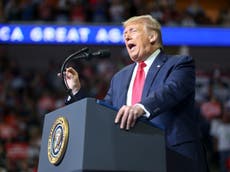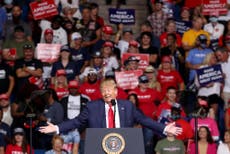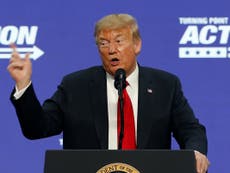Before you join AOC and praise K-pop fans for Trump's disappointing Tulsa rally, consider this
Are TikTok stars and Gen Z really going to save us all from a far-right future?

Donald Trump’s rally in Tulsa on Saturday night was not full, and its overspill areas outside the arena were empty. The crowd (online) went wild. Why? Because the campaign had boasted nearly a million signups for the event, local officials expected 100,000 people to show up, and Trump himself reportedly had to abandon his plan speak to crowds in an “overspill area” who couldn’t make it inside the packed venue. The president prizes his popularity with fans, which is why he loves rallies and speeches, and a rival group of fans and teens seemed to have got the better of him: the registrations for the rally were overwhelmed by people who had no intention of going. TikTok teens and K-pop fans got the credit.
The reaction from big names was swift: Alexandria Ocasio-Cortez praised TikTok users and K-pop stans for their work in a Twitter thread to squeals from supporters and fans and abuse from her obsessive anti-fans. She could add her name to stars like Jordan Peele, who applauded K-pop fans for their “Twitter-bombing” (organised overnight takeover of a hashtag, helped by the fans’ spread across time zones) of the racist White Lives Matter hashtag and their flooding of police information forms with fancams (short video clips of their idols).
Twitter and Facebook were equally noisy. Viral tweets and posts claimed that Gen Z, zoomers and/or megafans will save us all from fascism. Multiple big data experts “did numbers” by talking about the registration system for the rally as a data-gathering exercise that would now be useless (spoiler: nearly everything political parties and campaigns do that requires your email or phone number is for this purpose.) And, of course, there was also plenty of dismissive commentary denying that the multiple registrations did anything at all.
What actually happened: various different groups all organised multiple signups for the rally and the idea spread swiftly across different networks. Older people, younger people, TikTok users (thanks to a challenge, the platform thrives on them), K-pop fans (used to organising online), YouTubers. The “registering for a free rally and not attending” tactic has been used before, but this time it got more attention — and coincided with a president losing popularity and a pandemic that keeps most of his fan demographic safely at home.
K-pop fandom has a well-documented race problem. There’s a big streak of anti-blackness and anti-queerness in K-pop fandom, and fans bringing this up often face backlash and ostracization. The music and aesthetics of the idols draw heavily on Black culture, and Black fans are the ones behind campaigns relating to George Floyd and Black Lives Matter — yet white teens are the ones often getting the credit. The bands and singers themselves are usually silent on politics, taking days or even weeks to respond to campaigns like Black Lives Matter, and only one idol is openly gay.
Suga from BTS recently had to apologize for using a sample of cult leader Jim Jones, after outcry from Black fans. Those fans were then dubbed “antis” and shunned for embarrassing their idol rather than seeing any of the benefits from their work to improve society and culture — a familiar problem, because they are outnumbered in their fandoms and in the media by white fans and journalists resistant to critique.
The networks and friendships created by fandoms have created serious organising power that has benefited charities and ethical campaigns over a number of years. The Harry Potter Alliance, Tom Hiddleston fans, fans of K-pop band BTS — all have raised money and awareness to platform their idols but also improve society.
The downside is that vigilante fandom has existed for a while, both inside and outside of politics. Black fandom expert Keidra Chaney wrote powerfully about the “empowered stan”, a committed and organised hardcore fan who can be mobilised in order to defend the object of their fandom from any criticism or to attack their idol’s rivals. Celebrity “cancellations” have also arisen from this abuse of power.
Fandom is a weapon in politics. Trump uses it. Bernie Sanders used it, or at least the people around him did (for all that he said “not me, us”, not all the characterisation of “Bernie Bros” online was unfair.) Nigel Farage uses it. Both sides of the Brexit debate used it. Anti-trans activists use it. Tommy Robinson uses it and so does Andy Ngo. They communicate directly with their base, posting messages and images only the fans will understand or care about. Trump drinking water using only one hand at his Tulsa rally was cheered because of the memes of his seeming inability to do the same in West Point.
Fans have been weaponized in ways that most of the people cheering the TikTokkers on and calling them the future wouldn’t like. During Hong Kong’s long campaign for democracy, the mainland Chinese government have used fans and language related to fandom to post pro-China content and in Korea, the election candidates have had fangirls and fan songs and dances. Wonks and political campaigns looking to exploit this group that they’ve just discovered ought to be careful what they wish for. There have been fans for as long as there has been celebrity, and politics fans and political fans for just as long.
Fans are and have always been powerful but in different ways than you think — and much as anyone might want to, you can’t control their views or actions. Gamergate, 4chan and Discord Trump memes are the other side of the same coin, and we are in danger of fetishizing young fans and hiring TikTok zoomers as a silver bullet. It’s too easy to cheer what liberal political communication guys think of these groups instead of spending time understanding how fandom works in politics. The latter is my area of expertise, and in the past it’s often been roundly mocked. Maybe not so often now.






Join our commenting forum
Join thought-provoking conversations, follow other Independent readers and see their replies